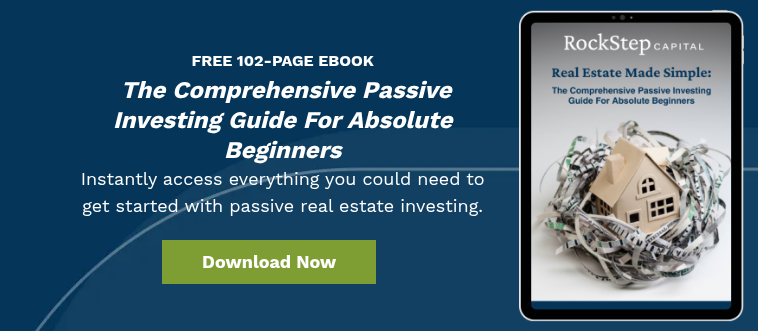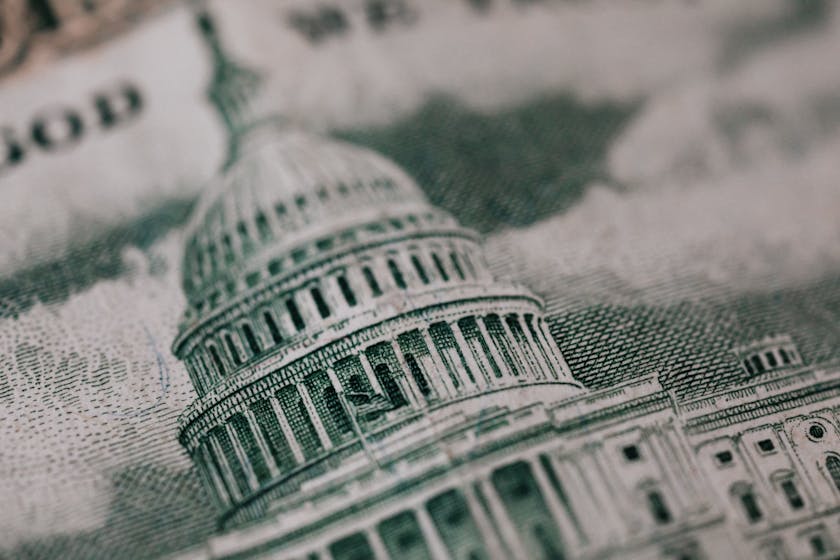The 5 Practical Investing Fees Passive Investors Need To Master
February 12th, 2025
6 min read

Passive real-estate deals come with several different fees, including acquisition fees, asset-management fees, disposition fees, personal-guarantee fees, and property-management fees. Understanding and comparing these fees allows you to evaluate how much of the return will go to the sponsor versus what you will receive.
Imagine investing in a high-end restaurant where you don’t have to cook, serve, or even manage the books. You just invest your money and share in the profits.
That’s essentially how passive real estate investing works. Instead of handling day-to-day operations, you partner with an experienced sponsor who manages the property and executes the business plan.
Just like in the restaurant business, where chefs, managers, and staff must be compensated, passive real estate investments involve various fees that pay the sponsor for their expertise and efforts. If you're new to this area, it's essential to understand these fees and how they affect your returns.
In addition to fees, sponsors are often compensated through a promote (also called a a carried interest), which is a percentage of the profits they receive once the investment hits a certain level of returns. This structure incentivizes sponsors to maximize the property’s performance, as their earnings are directly tied to the success of the deal. However, since the promote is separate from fees, investors should carefully evaluate both components to ensure they align with their financial goals.
In this article, we will discuss five common fees in passive real estate investing: acquisition fees, asset management fees, disposition fees, personal guarantee fees, and property management fees.
A Visual Breakdown of the Five Key Fees
To help you visualize how these fees fit into a passive real estate investment, here’s a quick overview of the five most common fees sponsors charge:
%20(1)%20(1).png?width=840&height=630&name=passive%20real%20estate%20fees%20%20(1)%20(1)%20(1).png)
Each of these fees serves a different purpose, from securing the deal to managing and eventually selling the property. Now, let’s explore what each fee covers and what investors should watch out for, starting with acquisition fees.
1. Acquisition Fees: Paying For The Deal's Setup
An acquisition fee is a one-time charge paid to the sponsor for their work in sourcing, negotiating, and closing on a property. This fee compensates the sponsor for the extensive upfront effort required to identify a promising investment, conduct due diligence, secure financing, and structure the deal for investors. Without this work, passive investors would need to spend months or even years searching for quality investment opportunities.
Think of an acquisition fee as similar to hiring a personal shopper to find the perfect luxury outfit. While you could visit multiple stores, compare prices, and ensure the right fit, that process requires both time and expertise. Instead, you can pay someone with industry knowledge to handle all that work on your behalf. Similarly, the sponsor searches for deals, negotiate the best prices, and organizes everything in a clear package for investors.
Example of Acquisition Fees
Imagine a real estate syndication purchases a shopping center valued at $10 million in a developing suburb. If the acquisition fee is set at 2%, the sponsor would receive $200,000 at the deal's closing. This fee compensates for the extensive market research, financial modeling, and negotiations conducted to facilitate the acquisition.
What to Watch Out For With Acquisition Fees:
- Unusually High Fees: Most acquisition fees range between 1% and 3%. Anything higher could be a red flag.
- No Fee At All: While it might seem like a win, a sponsor charging no acquisition fee could be making money elsewhere in less transparent ways.
2. Asset Management Fees: The Cost of Ongoing Oversight
An asset management fee is a recurring charge that compensates the sponsor for managing the investment after the property has been purchased. While property management companies are responsible for daily tasks such as rent collection and maintenance, the sponsor takes on a strategic role. This includes monitoring financial performance, optimizing revenue, making renovation decisions, and ensuring that the investment remains on track. This is especially crucial for value-added properties that require improvements and repositioning.
This fee is comparable to hiring a caretaker for a vintage car collection. If you owned a collection of classic cars but didn’t have the knowledge or time to maintain them, you would hire an expert to keep them in excellent condition. Similarly, an asset management fee ensures that a knowledgeable professional is consistently managing your investments and making decisions aimed at maximizing returns.
Example of Asset Management Fees
For instance, if investors contribute $5 million in equity, and the sponsor charges a 1.5% annual asset management fee, that amounts to $75,000 annually. This fee helps cover tasks like:
- Budgeting and Financial Reporting: Ensuring the investment stays on track.
- Overseeing Renovations: Making sure planned improvements add value.
- Market Monitoring: Adjusting strategy based on market trends and tenant needs.
Investors should compare asset management fees across multiple deals and ensure they align with industry standards. A high asset management fee could cut into investor returns if the sponsor doesn't provide much hands-on oversight.
3. Disposition Fees: Costs of Selling The Property
A disposition fee is paid to the sponsor when the property is sold. It covers the effort involved in coordinating the sale, working with brokers, negotiating terms, and ensuring a smooth closing process. Selling a large commercial property is far more complex than selling a house—it requires detailed market analysis, due diligence, and often multiple rounds of negotiations.
Let’s revisit the car analogy: hiring a broker to sell a classic sports car is similar to working with a sponsor when selling property. While you could try to sell it on your own, a professional broker who understands the market and has connections to the right buyers will likely secure a better price for you. Similarly, a sponsor plays a vital role in marketing the property to potential buyers and achieving the highest possible sale price.
Example of Disposition Fees
If a retail center sells for $15 million and the sponsor charges a 1.5% disposition fee, the sponsor would receive $225,000 at closing. Investors should be aware of this fee and ensure that it is within industry standards. While a disposition fee compensates the sponsor for their efforts, evaluating whether the sponsor is also receiving a promote upon sale is important, as excessive fees can reduce investor returns.
4. Personal Guarantee Fees: Compensation For Taking on Debt Risk
A personal guarantee fee is paid to the sponsor as compensation for guaranteeing a loan on behalf of the investment group. By personally guaranteeing the loan, the sponsor agrees to be legally responsible for repaying it if the property does not perform well or defaults. In the worst-case scenario, this could put their personal assets—such as their home, savings, and other properties—at risk.
This is similar to co-signing a car loan for a friend. If your friend has poor credit and can’t secure financing, they may ask you to co-sign. But you're responsible for the debt if they fail to make payments. Lenders sometimes require sponsors to take on similar personal liability in a real estate deal.
Example of Personal Guarantee Fees
For example, if a sponsor secures a $10 million loan and charges a 1% personal guarantee fee, they would receive $100,000 as compensation for taking on this risk. However, not all real estate investments require personal guarantees, so investors should verify whether this fee is necessary or if alternative loan structures exist.
5. Property Management Fees: Keeping Operations Running Smoothly
A property management fee is paid to a third-party management company (or, in some cases, the sponsor’s in-house management team) for handling day-to-day property operations. This includes leasing vacant spaces, collecting rent, responding to maintenance requests, and ensuring tenant satisfaction. While the sponsor focuses on high-level strategy, the property management team ensures the property functions efficiently.
This fee is similar to hiring a property manager for a vacation rental. If you own a beach house and prefer not to handle guest check-ins, maintenance problems, or cleaning, you would hire a property manager to take care of these tasks in return for a percentage of the rental income. Shopping centers and apartment buildings operate in the same manner, just on a larger scale.
Example of Property Management Fees
For example, if a retail center generates $1 million in rental income and the property management fee is 5%, that amounts to $50,000 annually. Investors should ensure that these fees align with industry norms, particularly if the sponsor owns the property management company, as conflicts of interest can sometimes arise.
Why This Matters For Investors
Understanding these fees is about ensuring you’re making a smart investment decision. Fees directly impact investor returns, and excessive fees can significantly reduce cash flow and profits. Comparing fees across different investments helps ensure they align with market standards. Investors should also assess whether the sponsor balances their compensation fairly with the investment's long-term success.
Final Thoughts: Balancing Fees With Returns
Passive real estate investing can be a great way to grow your wealth, but it’s important to go in with your eyes wide open. While fees are necessary for the business, they should be fair, transparent, and in line with market standards.
Before investing, ask yourself:
- Are the fees reasonable compared to similar deals?
- Is the sponsor providing enough value to justify their fees?
- Do the fees leave enough room for strong investor returns?
If all three are yes, you may have found a great opportunity. If not, it’s worth digging deeper or looking elsewhere.
For beginners, the first step is to equip yourself with fundamental information about passive real estate investing. Not sure where to start? Check out the resources available at RockStep Capital’s Learning Center. You’ll find articles covering everything from investment fundamentals to advanced strategies—all designed to help you make informed and profitable decisions.
Topics:


























